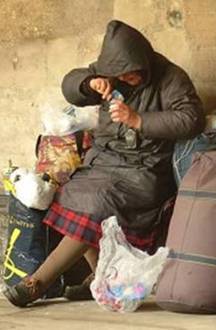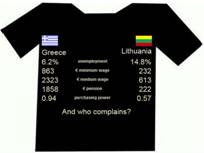
THE VOICE OF INTERNATIONAL LITHUANIA
|
VilNews has its own Google archive! Type a word in the above search box to find any article.
You can also follow us on Facebook. We have two different pages. Click to open and join.
|

"Lithuania's austerity was too harsh and too sudden"
Aage Myhre, 60, is the Norwegian architect, journalist and publisher whose community building skills have made him a small expat phenomenon in Vilnius. He is about to return to his home country after twenty two years in Vilnius, taking along his Lithuanian spouse and two daughters, but leaving his other object of admiration, Vilnius' Old Town, behind.
news2biz met Aage to ask him to reflect on his Lithuanian stay that lasted much longer than he expected.
Q: In Norway, Lithuanians last year became the second biggest immigrant community. How do you feel about it?
What I don't like about Norwegian authorities is that they are discussing only what advantages (low-cost skilled labour) or disadvantages (crime) the Lithuanian immigrants create for Norway. I never heard somebody say, 'This is so bad for Lithuania that we take their best brains'. If this issue was discussed from both sides early on, the authorities could have become more focused on it and could probably come up with some solutions.
Obviously, many Lithuanians wouldn't have left their country if it wasn't for the Andrius Kubilius' Conservative government's austerity policy that started in 2008. It was like putting brakes on in a car that was already standing still.
I personally urged Kubilius to write to Scandinavian prime ministers to seek some kind of assistance. For instance, to a country like Norway to support Lithuania would have cost very little.
Later I met Norway's Conservative Party leader and asked if Kubilius ever asked for help and support to deal with the crisis or the energy prices pushed up by Russia. She said, no, never.
Read the whole interview HERE...
__________________________
 Opinion: JP
Opinion: JPHochbaum, Chicago
The austerity
trap of the
Eurozone
__________________________

Lithuania’s former prime minister, Andrius Kubilius (left) is a staunch austerity advocate - for those who want to cut spending to reduce deficits and "restore confidence."
"Stimulus" spending, Paul Krugman (right) argues, would help reduce unemployment and prop up economic growth until the private sector heals itself and begins to spend again.
__________________________
Greeks won, Lithuanians lost!

Before they realized what is going on and who was robbing them, the Lithuanian people got clubbered by PM Kubilius’ ambitious austerity policy and the younger ones started emigrating in catastrophic numbers, seeing no future in the country whose GDP was reduced (from a low post-Soviet level) by some 20% by the combination of the old nomenklatura rent-seeking policies and the global Great Recession. Lithuania is hollowing out, unfortunately.
Read more…
__________________________
A far too bright picture of the present reality

The above post from Val Samonis, where he compares “crisis-hit” Greece and a Lithuania supposed to be quickly recovering from the 2008 crisis, internationally praised for its austerity measures, calls for reflection.
The difference is that while the people of Greece protest and angrily demonstrate in the streets of Athens, people here only become more and more bitter, emigrate, begets crime in other countries, etc.
Lithuania's elderly and disadvantaged people who have seen their minimum pensions drastically cut, and mothers seeing that the child benefits are completely removed as concept, they bow their necks and become even more active in growing potatoes on their garden spots outside the city instead of standing up against the government’s unfair measures against them...
This country's politicians claim they have been the smartest in...
__________________________
What is this country going to live on 20 years from now?

Palle Gravesen Jensen.
A Danish expat to Lithuania, owner of two manufacturing companies, Electronic House and Metalco Baltic. Member of the board of the Danish Chamber of Commerce (DCC) in Lithuania. His family was one of the three families founding the Vilnius International School.
There are a number of issues to discuss with regards to Lithuania of today, the country I made my own 16 years ago, moving from my homeland Denmark.
One particular question, however, comes to my mind again and again: What is this country going to live on 20 years from now. It is a big question. My concern is there will not be much at all if nothing is done immediately.
Category : Opinions
- Bookmark :
- Digg
- del.icio.us
- Stumbleupon
- Redit it
VilNews e-magazine is published in Vilnius, Lithuania. Editor-in-Chief: Mr. Aage Myhre. Inquires to the editors: editor@VilNews.com.
Code of Ethics: See Section 2 – about VilNews. VilNews is not responsible for content on external links/web pages.
HOW TO ADVERTISE IN VILNEWS.
All content is copyrighted © 2011. UAB ‘VilNews’.

 Click on the buttons to open and read each of VilNews' 18 sub-sections
Click on the buttons to open and read each of VilNews' 18 sub-sections 


